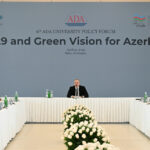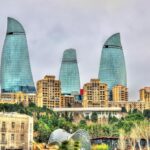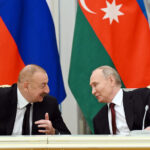One of the most distinctive features of the recent conflagration is the relatively limited involvement of the major regional and global powers. This has defied the expectations of many who traditionally analyze post-Soviet Eurasia through realist geopolitik or “great game” logic.
The actions of both parties disregarded the cautions of the major external players—the co-chairs of the OSCE Minsk Group (United States, Russia, and France), the EU, and NATO—while also coinciding with Azerbaijan’s chairmanship of the Nonaligned Movement (NAM). To attract support for their wartime objectives, military campaigns, and international legal discourses beyond Europe and Eurasia, both Baku and Yerevan have pursued largely overlooked diplomacy with states and international organizations representing the Global South—Asia, Africa, the Middle East, and Latin America. These conditions, encompassing a move beyond Western normative conceptions of conflict resolution, suggest the need for an alternative perspective for interpreting the substantial shift in regional dynamics.
Global and Regional Power Limitations
After decades of speculation that Russia might enter a renewed Karabakh war on behalf of its Armenian ally and its alleged clients in the Nagorno-Karabakh Republic (NKR) Defense Army, Moscow made it clear from the outset that the self-proclaimed Republic of Artsakh did not fall under its security commitments to Armenia proper. This conjecture nonetheless had long fostered the narrative in Azerbaijani national security circles that a Russia–Armenia–Iran axis posed an existential threat to Baku. Further, notwithstanding pan-Turkist opposition to the introduction of 5,000 Russian peacekeepers, Moscow ironically wound up imposing a settlement almost entirely in Azerbaijan’s favor. Armenia was forced to return the cultural capital of Shusha/i and surrounding territories and withdraw from each of the seven formerly occupied districts beyond Karabakh.
While numerous observers have identified Turkey’s indirect support (including military advisers, special forces units, Bayraktar TB2 drones, and reported employment of Syrian fighters) as a decisive factor in Baku’s battlefield success, these were a reflection of their longstanding security assistance and defense cooperation relationship. This partnership has evolved steadily since the 1990s, extending in recent years to joint production of armaments, and does not meet the criteria for a third party intervention in international conflict studies, or the direct involvement of regular troops in combat operations.
Similarly, previous predictions that a resumption of hostilities could develop into a post-Cold War proxy conflict between Russia and Turkey have also not been borne out by recent events (in particular, the establishment of a joint monitoring center in January 2021), perhaps being rooted in outmoded assumptions of geopolitical rivalry and dueling expansionist ambitions between former imperial powers in the South Caucasus.
Iran, which has had the dubious distinction of being variously characterized by experts as either sympathetic toward Armenia or Azerbaijan in the Karabakh conflict, was faced with pro-Baku demonstrations among ethnic Azeris in its northwestern provinces, stray rockets, mortars, and drones, and fears that shifts in control over neighboring territories could threaten its border security. Thus, Tehran once again positioned itself as a potential mediator with little or no ability to influence the behavior of the combatants.
Perhaps the most important aspect of the brief war is that Azerbaijan’s declared “counter-offensive“ to regain its territorial sovereignty was pursued against the admonitions of the major powers as represented by the co-chairs of the OSCE Minsk Group (United States, Russia, and France), whose efficacy and impartiality as mediators Baku has challenged for many years. The EU and NATO were seen to be equally ineffectual if not excluded from both the military and settlement phases. Preoccupied with advocacy for enlargement amid confrontation with Russia long prevalent in South Caucasus regional affairs, representatives from Brussels found themselves without a mechanism to make their rhetoric about “values” and “civilization” applicable to events as they unfolded.
Of particular significance is that the escalation to open warfare coincided with Azerbaijan’s chairmanship of the Coordinating Bureau of the Nonaligned Movement (NAM) from 2019-2022, in which Armenia holds only observer status, and from whose member states it has elicited official support for its position in Karabakh since the Tehran Summit of 2012. This highlights a sharp contrast between the at-best ambivalent support for the independence of Artsakh among governments and citizens in Armenia’s Global South diaspora and Azerbaijan’s more successful cultivation of legitimacy in the developing world for the use of force to regain its territorial integrity in opposition to the Minsk Group and permanent members of the UN Security Council.
Armenia: From Self-Determination to Remedial Secession
While the principle of self-determination of Nagorno-Karabakh has served as Yerevan’s primary negotiating position since the original 1994 ceasefire, in recent years, this has evolved into a more sophisticated legal argument. Political scientist Hovhannes Nikoghosyan recounts how the UN adopted the concept of “responsibility to protect” (R2P) in the instance of crimes against humanity in the mid-2000s to reassure Global South/NAM member states who perceived humanitarian interventions as a form of major power imposition. This set in motion an effort by Armenian academic and foreign policy elites to apply R2P to the Armenia-Azerbaijan conflict, building upon the linkage between the pursuit of recognition of the 1915 Armenian Genocide and the rights of Karabakh Armenians faced with existential threats from Turkey and Azerbaijan.
While in power 2008-2018, the government of former President Serge Sargsyan disseminated multimedia documentary materials on war crimes committed by Azerbaijani forces and commissioned a classified white paper by legal experts on remedial secession, while figures such as late ambassador and scholar Rouben Shouganian and former Foreign Minister Zohrab Mnatsakanyan have been prominent proponents of R2P in regard to Artsakh. These served as a foundation for its active promotion by Prime Minister Nikol Pashinyan during last year’s war.
On September 28, a day after fighting began, President Armen Sarkissian extended an official request to Egyptian President Abdel Fatah al-Sisi and King Abdullah II of Jordan, as the first Arab states to grant diplomatic recognition to Israel, to use their influence to achieve a ceasefire in order to protect the population of Artsakh. A statement released by the Egyptian foreign ministry only called upon the conflict parties to return to negotiations within the framework of the Minsk Group.
As Armenia’s premier strategic partner in the Middle East diaspora, Lebanon became a major source of aid donations and volunteer fighters receiving military training in Yerevan (in addition to those from Argentina, Syria, and the United States), particularly from the Bourj Hammoud district of Beirut, despite the ongoing political and economic crisis in that country. However, these activities were not directly sponsored by the Lebanese government, as MP Hagop Pakradounian, leader of the national wing of the Armenian Revolutionary Federation/Tasnag in the Lebanese Parliament, denied that these individuals were officially registered or sent by any party or organization while downplaying the number of persons involved.
In early October, the politically influential Armenian communities of Argentina and Uruguay staged mass demonstrations in solidarity with Armenia and Artsakh in Buenos Aires and Montevideo; yet, it is not clear that these were intended to exert pressure on their governments to recognize Nagorno-Karabakh. In public statements and conversations with his Armenian counterpart, Argentine Foreign Minister Felipe Solá identified Azerbaijan as the aggressor and called for the cessation of hostilities but stopped short of amending its position of upholding the negotiation process. While following the November 10 ceasefire, the Departmental Council of Montevideo released a declaration recognizing Artsakh as an independent state, it did not extend to national policy.
In accordance with Armenia’s burgeoning bilateral relations with India, signified in recent years by mutual support for increased integration of Artsakh and Kashmir with the mainland, on October 25, Pashinyan held an interview addressing the conflict on the New Delhi-based World is One News (WION) television channel. The appearance was widely publicized in Armenia through both press and social media outlets, as indicated by the prime minister’s official Twitter post: “I expect from India the same as from other reps of int’l community-state that Turkey moved mercenaries to Azerbaijan, initiated war, acknowledge that NK people face existential threat. Remedial secession & recognition of Artsakh should be considered.” However, the broadcast appears to have had little influence on public opinion or policymakers in India, which maintained its stance of neutrality.
Azerbaijan: Taking State Sovereignty into its Own Hands
The four 1993 UNSC resolutions (822, 853, 874, and 884) calling for a withdrawal of Armenian forces and resentment over their lack of implementation served as a basis for Azerbaijan’s appeal to the international community as the just party in the conflict for nearly thirty years. When Baku moved from observer status to full membership in the NAM in May 2011, President Ilham Aliyev and then Foreign Minister Eldar Mammadyarov drew upon the premise first suggested by former diplomat and professor of politics Fikret Sadikhov of an “additional platform” for conflict resolution, by folding the Karabakh issue into traditional Global South discourses of equality, social justice, and upholding international law. The continued relevance of the NAM as a forum for expressing dissatisfaction with the status quo within the UN system thus provided a foundation for the resort to “self-defense.” Legal scholars have identified a historical precedent for this strategy in the Ramadan/Yom Kippur War of October 1973, in which NAM member states broadly supported the “defensive” campaign launched by Egypt and Syria to regain the occupied territories from Israel that it seized during the 1967 Six-Day War.
As Baku’s most steadfast supporter in the Global South, Pakistan refuses to recognize Armenia, pledged possible military assistance in Karabakh as early as 2000, and draws direct comparisons with its sovereignty claims over Kashmir, which was formalized in the Trilateral Agreement with Azerbaijan and Turkey in November 2017. While the Foreign Office in Islamabad denied reports of Pakistani units in Karabakh in the Armenian and Indian press, an analysis of Urdu-language sources by Middle East Media Research Institute (MEMRI) reveals flight training for Azerbaijani fighter pilots and a meeting between Azerbaijani Ambassador to Pakistan Ali Alizade and General Nadeem Raza at the Joint Staff Headquarters in Rawalpindi to arrange emergency arms transfers during the first week of fighting. Pakistani flags were also publicly displayed in government-organized victory processions in Baku.
Most prominently, on October 19, seven Global South states (Indonesia, Niger, Tunisia, Vietnam, South Africa, Saint Vincent, the Grenadines, and Dominican Republic), which were simultaneously members of the NAM and non-permanent members of the UNSC, succeeded in pressuring the withdrawal of a draft declaration prepared by the Minsk Group Co-chairs. Representatives twice violated the recently formalized “silence procedure” by raising objections during a closed-door consultation on behalf of Council President Antonio Gutierrez calling on Armenia and Azerbaijan to cease and desist from military operations due to its lack of reference to the four 1993 resolutions.
Unpacking the bilateral relationships behind these motions reveals Azerbaijan’s deeper patterns of engagement with developing nations. Although Indonesia has gravitated from strong advocacy for Baku since the two countries’ mutual opening of embassies in 2005 toward aspiring to mediate after pursuing diplomacy with Armenia, politicians such as the chairman of the House of Representatives Committee for Inter-Parliamentary Cooperation, Fadli Zon, have insisted upon the UNSC resolutions as fundamental to resolving the conflict. Baku has recently sought to enhance ties with Niger both within the NAM and the Organization of Islamic Cooperation (OIC), for which President Aliyev donated the equivalent of $100,000 for the conversion of its development and humanitarian assistance department in Niger into a Regional Office. While in previous years, former foreign minister of Tunisia Khemaies Jhinaoui warned Azerbaijani representatives that Tunis would not take sides or interfere in what he termed a “domestic matter,” a change in government in 2020 may have altered this position. Vietnamese Communist Party officials had already publicly affirmed their support for the settlement of the conflict according to the principle of territorial integrity during mutual state visits to Baku and Hanoi in 2015. Support by Saint Vincent likely served as a quid pro quo for Baku’s cultivation of strong relations with small island states and provision of humanitarian assistance via the Azerbaijan International Development Agency (AIDA) following major floods in 2014.
Lastly, on October 23, Turkey’s ambassador to South Africa, Elif Çomoğlu Ülgen, who is also its representative to Baku, published an op-ed in the national Daily Maverick online newspaper. The essay appealed to Pretoria to become involved in the Karabakh issue as a mediator, which sought to manipulate its reputation as a leader of the Global South by comparing the historical legacy of the anti-apartheid struggle with ending the Armenian occupation of Azerbaijani lands (despite the tenuous connection). This built upon previous public relations activism by the embassy of Azerbaijan in South Africa since opening in 2012, which elicited support for territorial integrity and established the local solidarity group, Friends of Azerbaijan.
Conclusion
Among the “lessons learned” of the 44-day war is that both parties ultimately rejected Western liberal conceptions of conflict resolution, in which the normative and security concerns of all stakeholders must be recognized, and the resort to military force is the least desirable option. In the first case, the ambitions of radical modernizers in the Pashinyan administration since the 2018 Velvet Revolution to transform Armenian society in the image of Switzerland failed to override the popular association of Artsakh with their national identity. In the second, the notion of Azerbaijan’s “pro-Western” and “Euro-Atlantic” orientation touted over past decades by foreign commentators, think-tank experts, and the foreign service cadre alike has given way to the autonomy and self-reliance in achieving national goals. Perhaps then a more effective framework for explaining the unforeseen outcome in Nagorno-Karabakh would refer to the fundamental linkage between ethnicity, possession of territory, and statehood more reflective of the experiences of the Global South, rather than the interests of the major powers or attempts at reconstructing bipolarity in the South Caucasus.
Jason E. Strakes is a Coordinator at the Caucasus-Asia Center.










